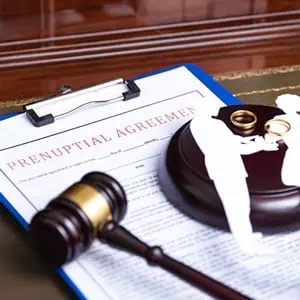 At the Law Offices of David Bliven, we understand that prenuptial agreements play a crucial role in safeguarding your interests before entering into a marriage. In the state of New York, while the law does not dictate every aspect of prenuptial agreements, there are important guidelines and considerations to keep in mind to ensure the validity and enforceability of these agreements.
At the Law Offices of David Bliven, we understand that prenuptial agreements play a crucial role in safeguarding your interests before entering into a marriage. In the state of New York, while the law does not dictate every aspect of prenuptial agreements, there are important guidelines and considerations to keep in mind to ensure the validity and enforceability of these agreements.
Settling A Prenuptial Agreement Without Disclosing Assets & Liabilities
Some of my clients have asked me whether they can create a solid prenuptial agreement without disclosing all of their assets and liabilities. The truth is, while it’s ultimately up to the parties involved to determine exactly how they want to complete their prenuptial agreement, it is always recommended to be as accurate and detailed as possible. This is especially important if you wish to signify that certain assets should not be considered marital assets. Doing so can ensure they are not shared with the other party in the case of a divorce.
It is best if the two parties either exchange sworn net worth statements – or at least list everything in a “Schedule” that clearly demonstrates each individual’s assets and liabilities with their exact value and other significant details. It is very helpful to use a “Schedule” to verify the validity of your claims, should that need arise in the future. Our law firm can guide you on exactly what you need to include in a prenuptial schedule to make sure your assets are protected.
The Key Requirements for A Valid Prenuptial Agreement
- A prenuptial agreement must be made in contemplation of a marriage.
- It should contain honest and accurate financial disclosure for both parties.
- Both parties should have a fair opportunity to read over the agreement so they fully understand it.
- Both parties must have adequate opportunity to have the document reviewed by legal counsel, or otherwise waive their right to counsel in writing.
- A prenuptial agreement must be signed by both parties and notarized to be legally binding.
- The document must be executed in the same manner as a deed, which typically involves attaching a certificate of acknowledgment.
Challenging A Prenuptial Agreement After It Has Been Signed & Settled
If one party no longer agrees with the provisions in a prenuptial agreement and wants it vacated, the agreement may be challenged in the context of a separation or divorce proceeding.
Should a prenuptial agreement be challenged after it’s signed and settled, the court will consider several factors, such as:
1.) Coercion
Any signs of coercion or undue pressure on either party can be grounds for challenging the agreement. Both parties should have access to legal counsel and be able to review the prenuptial without interference or time constraints. Offering the less financially advantaged party the opportunity to consult with an attorney and, if necessary, providing financial support for legal representation can strengthen the agreement’s validity.
2.) Unfairness
The court may examine whether the agreement is excessively unfair to one party, especially if substantial changes in circumstances have occurred since the agreement was executed.
3.) Lack Of Disclosure
Proper disclosure of financial information is essential, and failure to provide this information may lead to the agreement being vacated. It’s highly advisable for both parties to include detailed and accurate statements of all assets and liabilities. This is the reason for the importance of writing a schedule or net worth statement when drafting the prenuptial.
4.) Specific Provisions
Using vague or poorly defined terms when drafting the agreement increases the likelihood of it being vacated. If any provisions are left too vague, it becomes more likely that a judge will not be willing to enforce them.
While prenuptial agreements in New York offer valuable protection for a person’s assets, ensuring their enforceability requires careful consideration and adherence to legal guidelines. No matter what your unique goals may be, the best way to create a truly effective agreement that stands up to legal scrutiny is to consult with a knowledgeable attorney.
For more information on Settling A Prenuptial Agreement In New York, an initial consultation is your next best step. Get the information and legal answers you are seeking by calling (914) 362-3080 today.

Call Now To Schedule A 20-minute Case Assessment
Or Full 50-minute Case Strategy Consultation!
(347) 797-1188 | (914) 362-3080

